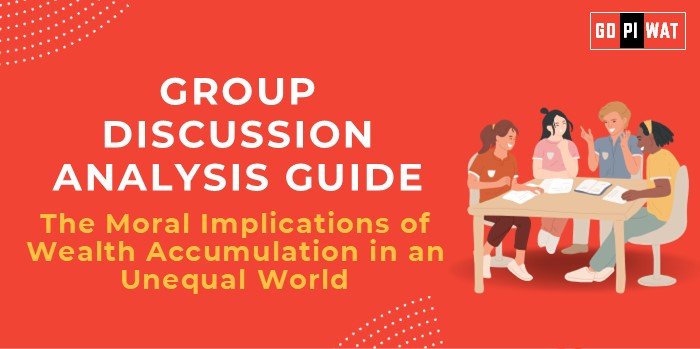📋 Group Discussion Analysis Guide: The Moral Implications of Wealth Accumulation in an Unequal World
🌐 Introduction to the Topic
Opening Context: The distribution of wealth across the globe has been a point of ethical debate, particularly in a world where the richest 1% own nearly half of global wealth, while billions live in poverty.
Topic Background: Discussions about wealth accumulation touch on capitalism’s efficiency and its ethical dilemmas. The divide has widened in the past decades, exacerbated by global crises such as the COVID-19 pandemic, technological disruptions, and policy inadequacies.
📊 Quick Facts and Key Statistics
- 🌍 Global Wealth Inequality: The top 1% holds 45.6% of total global wealth (Credit Suisse, 2023).
- 💰 Extreme Poverty: 9.2% of the world’s population lives on less than $2.15 a day (World Bank, 2023).
- 📈 Wealth Gap Growth: Billionaire wealth grew by 42% during the pandemic (Oxfam, 2022).
- 🏢 Corporate Influence: Top 100 companies control more wealth than many nations combined (WEF, 2023).
🤝 Stakeholders and Their Roles
- 🧑💼 Wealthy Individuals and Corporations: Act as drivers of economic growth but often criticized for wealth hoarding and evasion of social responsibility.
- 🏛️ Governments: Create policies to either bridge or exacerbate the wealth gap through taxation, welfare, and regulation.
- 🌐 Global Organizations: Advocate for equitable distribution of resources (e.g., UN Sustainable Development Goals).
- 👥 Civil Societies and NGOs: Push for ethical considerations in wealth distribution and poverty alleviation.
🏆 Achievements and Challenges
✨ Achievements
- 🤝 Philanthropy: Billionaires like Warren Buffett and Bill Gates have donated billions toward global health and education.
- 💡 Taxation Policies: Progressive tax regimes in some nations have reduced wealth gaps.
- 📈 Economic Growth: Wealth accumulation has financed innovation and employment.
⚠️ Challenges
- 🛡️ Tax Avoidance: Many corporations exploit loopholes to minimize taxes.
- 🔥 Social Unrest: Rising inequality often leads to social and political instability.
- 🌍 Global Comparisons: Scandinavian countries showcase equitable wealth distribution through welfare policies, while developing nations struggle with systemic corruption.
📄 Structured Arguments for Discussion
- ✅ Supporting Stance: “Wealth accumulation drives innovation, creates jobs, and leads to economic growth.”
- ❌ Opposing Stance: “Unchecked wealth accumulation exacerbates inequality, perpetuating cycles of poverty and social injustice.”
- ⚖️ Balanced Perspective: “While wealth can foster innovation, ethical distribution and social responsibility are critical for sustainable growth.”
🎯 Effective Discussion Approaches
- Opening Approaches:
- 📊 Start with a global statistic on inequality.
- 🧠 Use a thought-provoking quote on wealth ethics (e.g., “The greatness of a nation can be judged by how it treats its weakest members” – Gandhi).
- Counter-Argument Handling:
- 🛠️ Recognize the positive role of wealth creation but emphasize ethical obligations.
- 📜 Highlight examples of successful wealth redistribution policies (e.g., universal healthcare).
📊 Strategic Analysis of Strengths and Weaknesses
- 💪 Strengths: Drives economic growth, funds innovation, creates opportunities.
- 📉 Weaknesses: Widens inequality, fosters resentment, leads to systemic exploitation.
- 🚀 Opportunities: Promote inclusive policies, encourage ethical investments, strengthen global collaborations.
- ⚡ Threats: Risk of social unrest, political instability, climate inaction.
📈 Connecting with B-School Applications
- 🌐 Real-World Applications: Analyze CSR initiatives, study models of wealth redistribution.
- 🗣️ Sample Questions:
- 💬 “How should governments address wealth inequality in capitalist systems?”
- ⚖️ “Discuss the ethical implications of billionaires’ philanthropy.”


